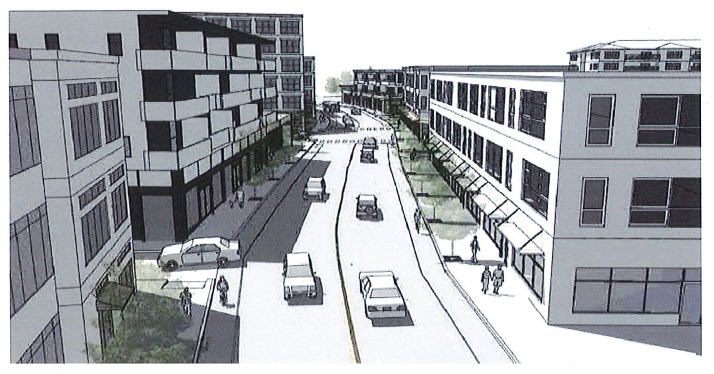Support More Housing and Greater Walkability for Asheville
We sent the letter below to Asheville City Council on July 9th.
Want to learn more about pro-housing actions that you can take with us in the future? Sign up for our email list here.
Asheville’s City Council has two new rule changes that they may consider this year. Together, if passed, these rules could promote more housing and more housing options in our city’s core neighborhoods and along transit corridors.

1. Legalize More Apartments!
Currently, Asheville has an arbitrary rule that says apartment buildings can’t easily be built with more than forty-nine homes. Anywhere in the city.
That’s because City Council is required to consider projects with fifty homes or more on a per-case basis. This politicizes the process, and it adds time and costs to the process of getting new homes built. It can take months and months for City Council to review these cases.
And the prolonged process also makes it significantly easier for wealthy residents in high-demand neighborhoods to try to prevent apartments from being built near them—even where our zoning code already allows them.
This arbitrary rule applies to everyone that might want to build homes—even non-profit home builders, and even those seeking to build subsidized homes at below-market costs.
A rule change would make it so that if a planned apartment meets the standards laid out by our local laws—standards that are already tailored to each neighborhood or “zoning district”—it will be more likely that the building can be constructed “by right,” which means without unnecessary political costs and delays.1
2. Support People Over Parking Lots!
Currently, Asheville has arbitrary rules that require new buildings to include a minimum number of parking spaces. These rules are called “parking mandates.”
When homes, including apartment buildings and detached houses, are required to have a certain number of off-street spaces for cars, that makes it less likely that housing can be built on smaller lots. It also means fewer homes can be put in that same available space. All of this results in higher costs for tenants relative to the size of their home, and fewer homes to go around overall.

In addition to being a barrier to building more infill housing, arbitrary parking mandates create a vicious cycle of car-dependency and sprawl, as homes must be built further from Asheville’s core neighborhoods and transit corridors because of the mandated space requirements for parking.
With parking mandates, the city effectively requires that the cost of parking be baked in to the cost of renting or owning a home—whether the occupant of that home wants off-street parking spaces or not. This is especially unfair to the nearly 1/10th of Asheville households that do not own a car. It’s unfair to those households that are “car light” as well.
A rule change won’t make parking spaces go away overnight. It will simply mean that residential buildings that don’t need a sea of parking spaces—ones that are close to public transportation, for example—won’t be required to include them in order to be built.2
These Rules Are Ready to Go
Asheville’s Planning and Zoning Commission and Asheville’s Planning & Urban Design Department have already approved of these two common sense rule changes.3
Now we just need City Council to put the changes on their meeting agenda, and to vote YES!
Open Letter to Asheville City Council
Dear City Councilors:
Asheville’s Planning and Zoning Commission, with the support of the city’s Planning & Urban Design staff, recently approved of two changes to the city’s Unified Development Ordinance (UDO) at its June 6th meeting.
We are writing to encourage the council to prioritize these zoning text amendments on the council meeting agenda and to see that they are passed.
Asheville is experiencing an unprecedented housing shortage which has driven rent and home prices sky-high, and induced population sprawl. These two proposed changes, while not sufficient on their own to solve the shortage, may be crucial in bringing elasticity to Asheville’s housing supply and promoting more housing infill, and in turn, more walkability in and near our core neighborhoods, close to jobs and amenities.
* * *
The first change is adjusting the “Level Two” development upper-limit threshold for residential projects from fifty units to 100,000 square feet.
Non-residential uses are already approved in the UDO for by-right construction up to 100,000 square feet. The proposed change would only set the same bar for residential use. This means a more even playing field across uses. It will lead to less uncertainty and a more predictable outcome for housing developers that have projects in mind that will meet the requirements of a given zoning district.
This is not about eliminating the “conditional zoning” process. Rather, it means removing some of the present ambiguity in our UDO that says developers must face extra costs, extra time, and extra risk for projects that already meet the standards laid out by our zoning code. This ambiguity constrains growth in the city’s housing stock and pushes development outside of our city limits.
* * *
The second proposed change to the UDO involves eliminating residential parking mandates across the city.
In Asheville’s recent “Missing Middle Housing Study,” no code reform is mentioned more frequently than parking. Any substantive middle housing initiative that city staff proposes will not succeed if we don’t eliminate parking mandates.
Reforming our parking requirements will not eliminate off-street parking in our neighborhoods overnight. Nor will it prevent new homes—whether they are single-family, “middle housing,” or larger apartment complexes—from including parking. Rather, this change would bring more flexibility to builders that want to add more housing stock in the places where homes are most needed—in and near our core neighborhoods, where jobs, amenities, infrastructure, and sustainable transportation alternatives already exist.
Reforming our parking mandates may promote “unbundling” of parking, which means that apartments will charge tenants an added fee if they that want to reserve a parking space. Unbundling parking especially benefits renters that do not own cars. Removing parking mandates may also promote car-sharing as well as the use of alternate forms of transportation.
* * *
While these two proposed changes will reduce obstacles to seeing more housing built, they are by no means radical. They do not actually change what is permitted in any of the city’s zoning districts, in terms of building size, residential density, lot coverage, etc.
These changes are common sense and should be approved without delay.
It will take a large variety of tools to fix Asheville’s housing crisis. These two proposed changes to the UDO should be understood as important tools for our toolbox, to be used alongside others.
Sign the Letter to City Council
This form is no longer active. Stay up to date on future actions by signing up for Asheville For All emails here.
-
Here are the technical details for the proposed change to Asheville’s residential development thresholds, as presented in a memo from Asheville city staff to the Planning and Zoning Commission ahead of its June 2024 meeting. Note that a threshhold would remain for any residential development with over 100,000 square feet of floor space. ↩
-
Here are the technical details for the proposed change to Asheville’s parking mandates, as presented in a memo from Asheville city staff to the Planning and Zoning Commission ahead of its June 2024 meeting. Note that the amendment under discussion was amended by the Planning and Zoning Commission to eliminate all residential parking mandates citywide. ↩
-
You can find the minutes from the June 2024 Planning and Zoning Commission meeting here. ↩
